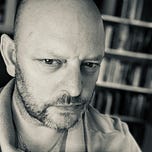Welcome back to another episode of On the Edge with Jon Biddle. Today, we’re delving into the twisted, eerie world of my debut novel, Harvester, and exploring how its themes connect with both historical horrors and personal healing.
The Dark World of Harvester
Harvester isn’t your typical thriller—it's a dark, psychological journey that plunges deep into the human psyche. The story kicks off with Alex Brown, a resilient female detective, who finds herself embroiled in a deadly game of cat and mouse with a sadistic serial killer. The killer's lair? A food recycling plant where human meat is stored—a chilling backdrop that sets the stage for a narrative packed with terror, suspense, and the kind of dark humour that only the brave can appreciate.
This story, inspired by the darker side of Stephen King and the horror of James Herbert, features Alex, a character inspired by my wife, Sam. Without realising it, I embedded her middle name, Alexandria, and her maiden name, Brown, into this fierce detective character. It's a subliminal homage to the strength, determination, and sharp mind that Sam embodies, traits that Alex also brings to her battle against evil.
Crafting a Female Protagonist
Why a female protagonist? It's a question I get asked often. We’re living in an age where the female voice is more powerful than ever, and I wanted to reflect that through Alex. She’s not just tough—she’s smart, resilient, and has had to fight for every ounce of respect she’s earned. Her journey mirrors some of the real-world battles women face today, from misogyny in institutions to the ongoing fight for equality.
Meet the Villain: Dale Brock
And then there's Del Brock, a villain who could give Hannibal Lecter a run for his money. Brock is a narcissistic monster, a classic serial killer who embodies the darkest aspects of unchecked power. Creating Brock meant diving into the terrifying corners of the human mind, a process as disturbing as it was fascinating. As Alex hunts him down, the line between saviour and monster blurs, making you question what really separates good from evil.
Historical Horrors: The Dark Ages
But Harvester isn’t just about fictional horrors. In my upcoming blog post, we’ll take a detour into the real-life horrors of history, particularly the Dark Ages. The fall of the Roman Empire plunged Europe into chaos, a time where survival was uncertain, and the landscape was reshaped by invading forces like the Visigoths, Ostrogoths, Vandals, and Vikings. These historical narratives are a powerful reminder that even in the darkest times, there is potential for renewal—a theme that echoes in Harvester.
Personal Reflections: Complex PTSD and Poetry
Shifting gears, let’s dive into something deeply personal—understanding Complex Post-Traumatic Stress Disorder (CPTSD) and its impact on my life and writing. Unlike PTSD, which stems from a single traumatic event, CPTSD is the result of prolonged or repeated trauma, often during childhood. It’s a journey filled with emotional flashbacks, toxic shame, and a relentless inner critic, making everyday life a battle.
Healing from CPTSD isn’t just about surviving; it’s about truly thriving, reclaiming lost parts of yourself, and quieting that inner critic. For me, poetry has been a vital part of this healing process. Every Saturday, I share a poem connected to my personal reflections in therapy. These aren’t just words—they’re pieces of my soul, shaped by complex emotions and thoughts that surface during my sessions. Writing poetry is both cathartic and empowering, allowing me to transform pain into something beautiful and meaningful.
The Power of Poetry
Poetry has an incredible ability to distill intense emotions into a few carefully chosen words, capturing the essence of an experience in a way that feels both raw and profoundly true. It’s a language that speaks to the core of my experiences, offering clarity and insight where conventional words might fail. Through sharing my poetry, I hope to connect with others on a similar journey, offering a sense of solace, understanding, and perhaps even a bit of forgiveness—something we all need to give ourselves.
Finding Strength in the Darkness
As we wrap up today’s exploration, I want to leave you with a thought: life, much like the stories we tell, is full of challenges, but also opportunities for growth, resilience, and renewal. Whether you’re navigating the ruins of a fallen empire, the complexities of trauma, or the dark corners of your own mind, remember that you’re not alone. We’re all walking this path together, finding strength in our stories and in each other.
So, stay curious, stay resilient, and keep finding the light in the darkness. And remember—no matter how dark the night, the dawn always follows.
See you next week, and stay frosty.
Jb














Share this post